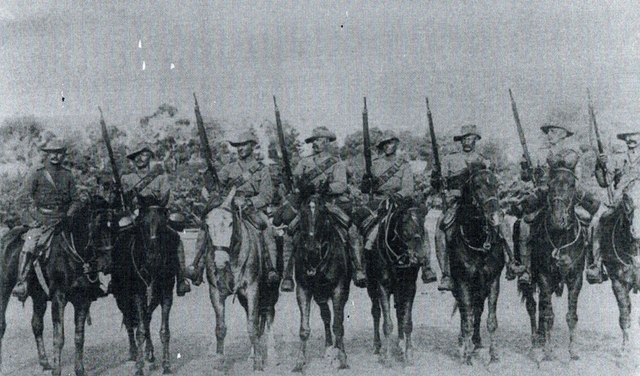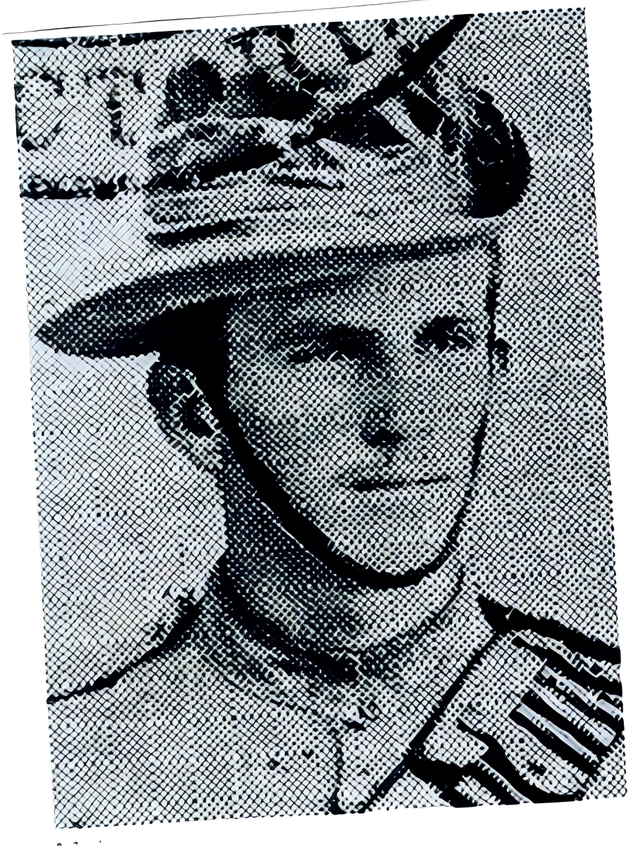When researching Allora’s greatest war heroes, it is difficult to decide which one is perhaps the greatest. This small town on the Darling Downs produced many military personnel from the Boer War from 1902 to World War II and have been acknowledged accordingly. At one time from 1919 to 1920 it was the home of Victoria Cross winner John Leak who won his award on 23 July 1916 at Pozieres, France, and on return purchased a property at Allora, but was not born there. Among the war heroes already acknowledged were the four Carr Clark brothers of Talgai recently written about, Peter Jensen, Robert Brown and the four Wakefield brothers from nearby Deucher. Harry, Sydney, John and Herbert. Herbert was awarded the Distinguished Conduct Medal for his service. However, it could be argued that of these great heroes, perhaps Charles Edwin Deacon would have to be given serious consideration for his service over the two wars. Here is Charles’s record that inspired this story.
Charles Edwin Deacon was born at Allora, Queensland, on 15 January 1878, the youngest son of William and Ann Deacon. He received his early education at Allora State School before attending Brisbane Grammar School.
After his schooling in Brisbane, Charles returned to Allora to work in his father’s store and on the several local properties that William owned in the district.
When the Boer War broke out in 1900 and a call from England to assist them with a contingent of horsemen from the colonies, Charles decided to enlist as a “Bushman” in the Queensland Mounted Infantry for service in South Africa. He was given a rousing farewell in Allora’s Copelin’s Hall on 1 February 1900 before he became one of 320 infantry men who embarked on board the “Duke of Portland” on 1 March 1900 arriving there on 3 April.
The contingent became a section of the Australian Bushman’s Corps who had been sent to South Africa earlier and was camped at Beria awaiting further orders.
Charles and the regiment were involved in operations in Rhodesia from 20 April to 25 May before the regiment was dispatched to Mafeking to help in the defence of Eland’s River under the command of Major C. Kellie. The town had been under siege for several months and defended by Colonel Baden-Powell, Commander of British forces, Mafeking District, on the Western Transvaal border from a powerful Boer force to act as a Garrison guard. (It was in this conflict that another Warwick hero in Lieutenant James Annat, was killed.
Altogether, Charles campaigned from 3 June 1900 to 1 January 1901, before his service in South Africa ended. He fought at Eland River, Orange River Colony, Rhen Kop, and the Transvaal. He was promoted to corporal in December 1900 and then sergeant in 1902. When the war ended, Charles and the regiment came home on board the “Morayshire” on 9 May 1901. He received five silver clasps to his South African campaign medals. Sergeant Charles Deacon finished his service when his regiment was disbanded on 10 December 1901.
On 18 March 1902, British authorities invited Australia to send a contingent of troops to the Coronation of King Edward V11 in Westminster Abbey on 26 June 1902. The Australian Government agreed to send mounted troops chosen from those who had exceptional service in the South African campaign and were still serving in South Africa.
Charles Deacon was one of 17 selected from Boer War veterans and embarked from Sydney on board the passenger ship “Rome” on 30 April 1902 with Officer Commanding, Lieutenant-Colonel C. St. Cameron CB, of the 1st. Tasmanian Mounted Infantry. It was assumed that the Contingent would comprise over 150 men.
Unfortunately, the Coronation was cancelled until 9 August owing to the King’s health, but the contingent stayed in England until the Coronation which then occurred on 9 August, and the contingent eventually left for home on board the liner “Arcadia” arriving a few weeks later.
Charles Deacon’s active military service now ended when his unit was disbanded, and so Charles returned to Allora to take up the running of the family Produce and Merchant store with his brother Herbert. However, his interest was still in his old regiment so, in 1904, he was appointed as a Lieutenant in the 14th Light Horse Regiment and stationed at Allora.
On 1 April 1908, Charles married a local girl, Elizabeth Ann Burge at St. David’s Church in Allora and on 23 April,1910 they were blessed with the arrival of their only child, a daughter, whom they named Majorie.
In 1914 Charles left the family store and gained employment as a Federal Land Tax valuer and combined this with his duties as a reservist officer commanding the 11th Light Horse Regiment until he was transferred to the unattached list.
From 1904 until 1912, he was steadily promoted in his regiment and by 1916, was promoted to Lieutenant Colonel in command of an AIF Light Horse Regiment. He never got to serve in an active role in World War I as his wife “Bessie” did not want him to go to the battlefront, possibly, because of the heavy casualties at Gallipoli, which included her brother.
Charles continued in his role with the regiment during World War I until 1 January 1919 when he was transferred to the Reserve list. During World War 2, Charles worked as a Reporting Officer at Victoria Barracks in Brisbane and was very active as a recruiting officer for the Australian Imperial Remount Unit.
Charles Edwin Deacon led an extremely active military life both on the war front in South Africa, and later, at home in his involvement with the Australian Light Horse. He remained with the Federal Taxation Department from 1913 until his retirement in 1942.
He was endowed with plenty of endurance as he worked in both civil and military roles throughout his life and will be forever remembered by the people of Allora.
On retirement, he spent his final years on his small grain farm “St. Crispins”, near his beloved town of Allora. He maintained his interest in sport, particularly in cricket, golf, and tennis. He was a great Australian and will be fondly remembered by the citizens of Allora each Anzac Day, as one of the district’s great soldiers.










